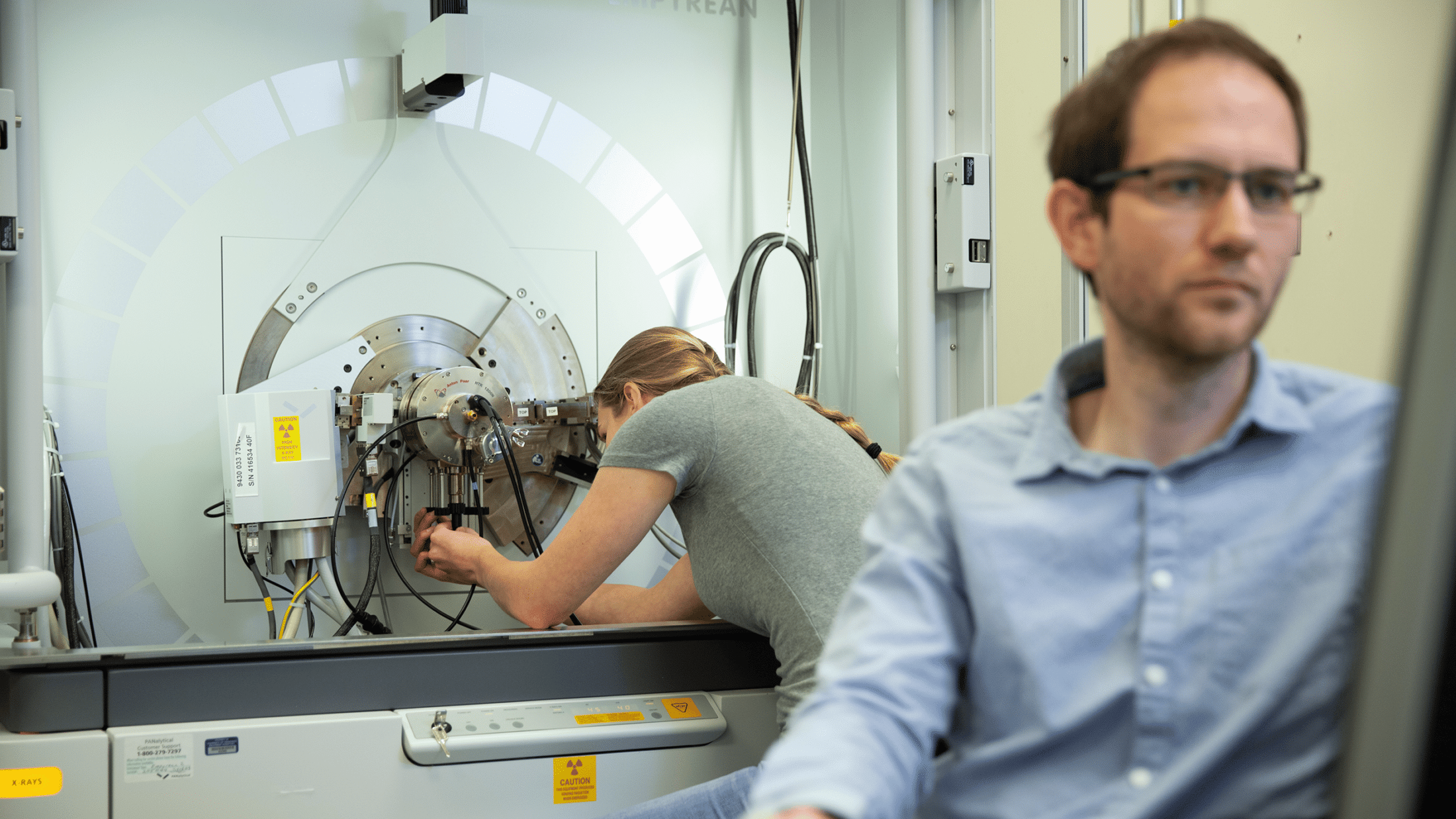Diffraction Facility

Individuals from academia, national labs, and industry use the Diffraction Facility to perform a wide range of experiments. Basic usage revolves around the identification and quantification of phases, crystallinity, lattice parameters, crystallite size, and microstrain.
More advanced uses include high-temperature in-situ experiments, investigating preferred orientation with pole figures, determining residual stresses, and studying thin films with X-ray reflectivity, among others.
The facility has two “powder” diffractometers that can accommodate powders, solids, and thin films; one single crystal diffractometer; and one X-ray fluorescence instrument.
Staff
Claudia Rawn
Director & Scientific Leader
crawn@utk.edu
Contact for scientific questions.
Claudia Rawn is an associate professor in UT’s Department of Materials Science and Engineering (MSE) and director of the UT Center for Materials Processing. Prior to joining the university full time, she was a senior research staff member in the Diffraction and Thermophysical Properties Group at Oak Ridge National Laboratory (ORNL) and a joint faculty member in MSE. Her research interests include the investigation of crystal structures, phase transitions, and thermophysical properties of materials using in-situ X-ray and neutron diffraction.
Rawn received her BS’s from Virginia Polytechnic Institute and State University in materials engineering her MS from George Mason University in chemistry, and her PhD from the University of Arizona in materials science and engineering. Upon completion of her PhD, she became a postdoctoral research associate in the ceramics department of the Jozef Stefan Institute (IJS), in Ljubljana, Slovenia. She then joined the Materials Science and Technology Division at ORNL with the Oak Ridge Associated Universities Postdoctoral Fellowship program. Rawn’s professional activities include being a past secretary of the US National Committee for Crystallography, and she is a Fellow of ASM International.
Michael Koehler
Facility Manager
mkoehler@utk.edu
Contact for scheduling activities and hardware questions.
Michael Koehler obtained his BS, MS, and PhD from UT in materials science and engineering. His dissertation involved characterizing magnetostrictive materials using resonant ultrasound spectroscopy, vibrating sample magnetometry, and neutron and X-ray diffraction, among other techniques. He then continued as a post-doc, during which time he grew 2D semiconductor crystals using chemical vapor transport. He then became lab manager for the Diffraction Facility where he trains new users so they can schedule and use the instruments on their own, performs experiments and data analysis for any users who do not want to be trained (at an additional cost), and assists users in designing the best experiment for their particular samples/interests.
Instruments
Empyrean – XRD
- Radiation
- Copper (default)
- Cobalt (upon request)
- Silver (upon request)
- Measurements
- Phase identification
- Phase quantification
- Lattice parameters
- Crystallinity
- Crystallite Size
- Microstrain
- Pair distribution function (PDF) – room-temperature and in situ high-temperature XRD (HTXRD)
- Thermal expansion (in situ HTXRD)
- Reaction equations (in situ HTXRD)
- Reaction temperatures (in situ HTXRD)
- Reaction kinetics (in situ HTXRD)
- Sample Types
- Powder
- Solid
- Thin film
- Hardware
- Incident Side
- Parallel beam mirror
- Programmable divergence slits
- Focusing mirror
- Diffracted Side
- Programmable anti-scatter slits
- Fixed anti-scatter slits
- Parallel plate collimator
- Xe proportional detector
- PIXcel3D detector
- Incident Side
- Sample Stages
- Reflection/transmission/spinner (default)
- Anton Paar HTK 1200N (high temperature)
- Dry air, ambient air, inert gas, and high vacuum environments
- Programmable XYZ
- Chi-phi-Z
X’Pert3 MRD – XRD
- Radiation
- Copper
- Measurements
- Phase identification
- Lattice parameters
- Crystallinity
- Crystallite size
- Microstrain
- Texture (aka preferred orientation or pole figures)
- Residual stress
- Grazing incidence XRD
- High resolution XRD
- Sample Types
- Fiber
- Solid
- Thin film
- Hardware
- Incident Side
- Parabolic mirror
- Double crossed slits collimator
- 4X Ge(220) 4 crystal monochromator
- Diffracted Side
- Parallel plate collimator
- Rocking curve optic
- Two bounce asymmetric triple axis analyzer
- Xe proportional detector
- Incident Side
- Sample Stage
- 5 axis (chi-phi-X-Y-Z) cradle
XtaLAB Mini II
- Radiation
- Molybdenum
- Temperature Range
- 100-300K
- Sample Types
- Single crystals
- Must be 500 microns at most; 300 microns or smaller is preferable
- Full structure solution as a function of temperature
- Powders
- Enough to fill a 300 micron loop
- Can determine phase evolution as a function of temperature (space group and lattice parameters)
- Single crystals
- Single crystal structure solution includes determination of
- Space group
- Lattice parameters
- Atomic displacement parameters (ADPs)
- Site occupancy factors (SOPs)
- Advantage
- An almost imperceptible amount of sample is required for data collection
Epsilon 1 – XRF
- Radiation
- Silver
- Measurement
- Element identification
- Element quantification
- Sample Types
- Loose powder
- Pressed pellet
- Solid chunk
- Limitation
- Unable to detect elements lighter than fluorine
- Advantages
- Sample preparation typically takes a minute or two
- Data collection typically takes 3.5 minutes
User Rates
Assisted help is billed in addition to the regular instrument rate. Rates for instrument time indicate self-use. Any operation of the instrument by staff will incur an additional charge for staff assistance. Staff-assisted time must be booked in advance of reserving instrument time.
Listed rates below are per hour of use except Rigaku XtaLAB, which is listed per sample
| Internal Academic | External Academic | On-campus Commercial | External Commercial | |
|---|---|---|---|---|
| Empyrean | $40 | $55 | $90 | $100 |
| X’Pert3 | $40 | $55 | $90 | $100 |
| Epsilon 1 | $30 | $40 | $54 | $60 |
| Rigaku XtaLAB (per sample) | $60 | $90 | $90 | $100 |
| Assistance* | $60 | $90 | $90 | $100 |
User rates subject to change without notice.
Additional Resources
Existing users may book time via Stratocore. New users contact Michael Koehler.